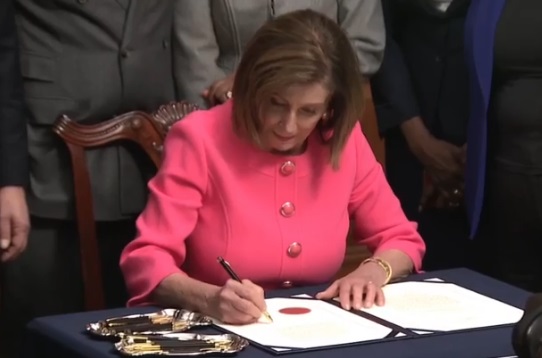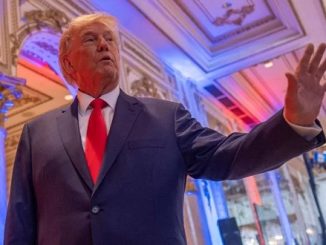
The US House of Representatives has passed a resolution to submit articles of impeachment against President Donald Trump to the Senate for a trial.
The resolution passed largely along party lines by 228 votes to 193.
House Speaker Nancy Pelosi signed copies of the articles alongside the team of Democratic lawmakers who will prosecute the case against Mr Trump.
The House, controlled by opposition Democrats, impeached the president last month.
The Senate, controlled by Mr Trump’s Republican Party, will decide whether to convict and remove him from office.
At a press conference before the signing of the articles, Mrs Pelosi said: “Today we will make history. When the managers walk down the hall, we will cross a threshold in history – delivering articles of impeachment against the president of the United States for abuse of power and obstruction of the House.”
The articles were then transferred to the Senate, where Republican Senate leader Mitch McConnell said they would be exhibited on Thursday at noon, followed by a reading on the floor of the upper chamber. He said the trial would begin on Tuesday.
The president is accused of abuse of power and obstruction of Congress. He denies trying to pressure Ukraine’s leader during a phone call on 25 July last year to open an investigation into his would-be Democratic White House challenger Joe Biden.
Mr Trump has been touting unsubstantiated corruption claims about Mr Biden and his son, Hunter, who accepted a lucrative board position with a Ukrainian energy firm while his father handled American-Ukraine relations as US vice-president. Mr Biden is one of a dozen candidates campaigning for the Democratic Party’s White House nomination.
The Senate trial will be only the third of a US president in history.
Will he be removed from office?
While Democrats control the House, Mr Trump’s fellow Republicans hold sway in the Senate 53-47 and are all but certain to acquit him. It remains to be seen how the case could influence the president’s campaign for re-election this November.
Democrats hope the impeachment will carry symbolic weight. Mrs Pelosi, who launched the impeachment inquiry in September, said on the House floor before the vote: “We are here today to cross a very important threshold in American history.”
All Republicans voted against the resolution to transmit the articles of impeachment. Only one Democrat, Collin Peterson of Minnesota, did not vote in favour. Democrats were joined by Justin Amash of Michigan, a former Republican who left the party to become an independent.
The Republican leader in the House, Kevin McCarthy of California, said Democrats were trying to remove the president with the “weakest case”. He called it a “sad saga”.
How will the trial work?
Mrs Pelosi appeared earlier at a news conference with the seven “managers” who will prosecute the Democratic case against the Republican president. They will be led by Adam Schiff, the chairman of the House intelligence committee.
The six others are Jerrold Nadler, head of the House judiciary committee; Hakeem Jeffries of New York; Zoe Lofgren of California; Jason Crow of Colorado; Val Demings of Florida; and Sylvia Garcia of Texas.
White House lawyers Pat Cipollone and Jay Sekulow have been tipped to lead the president’s defence team. The Republican leader of the Senate, Mitch McConnell, said opening statements in the trial were expected next Tuesday.
Supreme Court Chief Justice John Roberts will be sworn in to preside, and he will administer an oath to all 100 senators to deliver “impartial justice” as jurors. Mr McConnell angered senior Democrats when he appeared to abandon that responsibility, saying Senate Republicans would act in lockstep with the Trump administration.
During an event at the White House, Mr Trump rejected the impeachment charges as a “hoax”.
The Senate trial could still be under way in early February when Iowa and New Hampshire hold the first contests to pick the eventual Democratic presidential candidate.
Mrs Pelosi defended her decision to hold off submitting the impeachment articles to Congress for more than three weeks as she quarrelled with Senate Republican leader Mitch McConnell about the trial rules, and even fellow Democrats urged her to stop stalling.
“Time has been our friend in all of this, because it has yielded incriminating evidence, more truth into the public domain,” she told reporters.
As Mrs Pelosi spoke, Mr Trump tweeted to call the process a “Con Job by the Do Nothing Democrats”.
Will there be witnesses?
One of the biggest sticking points between House Democrats and Senate Republicans is over what testimony will be allowed at the trial. The Senate’s trial plan will guarantee votes on whether to call witnesses and hear new evidence, Republican senators Lindsey Graham and Mike Rounds said on Tuesday.
It takes just 51 votes to approve rules or call witnesses, meaning four Republican senators would have to side with Democrats to insist on testimony. The White House is understood to have identified several possible defectors in the Republican ranks, including Ms Collins and Mr Romney.
The others are Senators Lisa Murkowski of Alaska, Cory Gardner of Colorado and Lamar Alexander of Tennessee, who is retiring this year. Ms Collins said: “My position is that there should be a vote on whether or not witnesses should be called.”
Mr Romney said he wants to hear from John Bolton, the former National Security Adviser, who has said he would only testify if served a legal summons.
“I expect that barring some kind of surprise. I’ll be voting in favour of hearing from witnesses after those opening arguments,” Mr Romney said.
Republicans say that if witnesses are allowed, they may try to subpoena Mr Biden and his son, and the unidentified government whistleblower whose complaint about Mr Trump sparked the whole impeachment inquiry.
A White House senior official official told reporters on Wednesday that the president would have the right to call witnesses should the Democrats do so, adding that it would be “extraordinarily unlikely” for the trial to run beyond two weeks.
Who are the House managers?
Adam Schiff, 59, (California) a Harvard-educated lawyer who presided over much of the House impeachment inquiry
Jerry Nadler, 72, (New York), the judiciary committee chairman who has been an adversary of Mr Trump since the 1980s
Zoe Lofgren, 72, (California) a Capitol Hill staffer during Nixon’s impeachment inquiry, she voted against President Clinton’s impeachment
Hakeem Jeffries, 49, (New York), a corporate lawyer by training and chairman of the Democratic caucus
Val Demings, 62, (Florida) who was the first female police chief in Orlando. She sits on the judiciary and intelligence committees
Jason Crow, 40, (Colorado) a former Army Ranger and Afghan and Iraq wars veteran who wrested a seat from a Republican in 2018
Sylvia Garcia, 69, (Texas) a first-term congresswoman who previously served as a judge for the Houston municipal court system
Source: bbc.co.uk






Be the first to comment